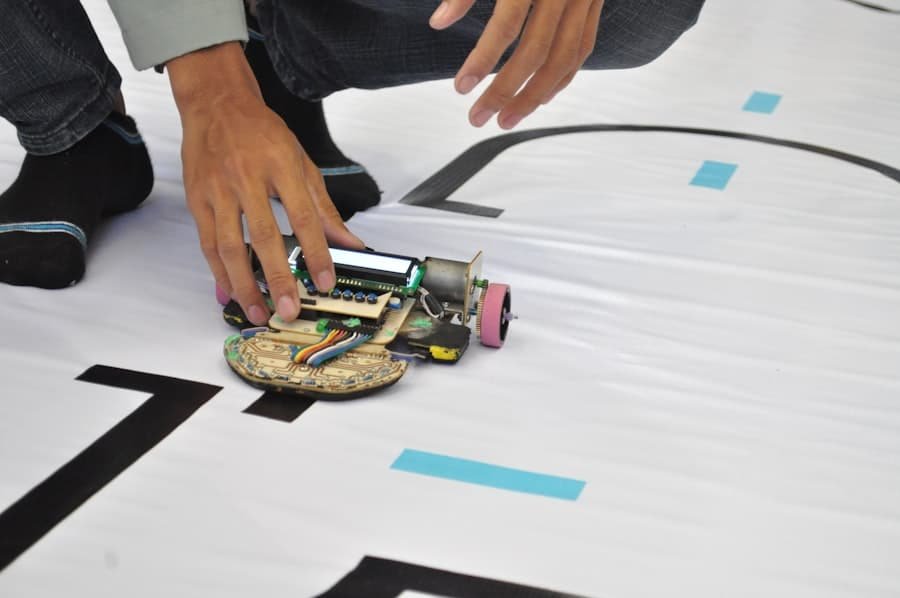Artificial Intelligence (AI) has emerged as a transformative force in the modern landscape of innovation, reshaping industries and redefining the parameters of creativity and efficiency. The integration of AI technologies into various sectors has not only accelerated the pace of innovation but has also introduced new methodologies that challenge traditional paradigms. From machine learning algorithms that analyse vast datasets to natural language processing systems that facilitate human-computer interaction, AI is at the forefront of a revolution that is altering how we conceive, develop, and implement innovative solutions.
The synergy between AI and innovation is particularly evident in the way organisations approach problem-solving and product development. As businesses strive to remain competitive in an increasingly complex environment, they are turning to AI to enhance their capabilities. This relationship is not merely about automation; it encompasses a broader spectrum of possibilities, including enhanced decision-making, improved customer insights, and the ability to predict market trends.
The implications of this partnership are profound, as they pave the way for a new era of creativity and efficiency that was previously unimaginable.
Summary
- AI is revolutionising traditional innovation processes by streamlining and automating tasks.
- AI plays a crucial role in predictive innovation by analysing data and identifying future trends and opportunities.
- AI has a significant influence on creative problem solving by providing new perspectives and solutions.
- The ethical implications of AI in innovation must be carefully considered to ensure responsible and fair use.
- AI contributes to rapid prototyping and iterative design by speeding up the development process and improving product quality.
AI’s Impact on Traditional Innovation Processes
The traditional innovation process often follows a linear model, characterised by stages such as idea generation, development, testing, and market launch. However, the introduction of AI has disrupted this model, enabling a more dynamic and iterative approach. For instance, AI-driven analytics can provide real-time feedback during the development phase, allowing teams to pivot quickly based on consumer preferences or emerging trends.
This shift not only reduces time-to-market but also enhances the relevance of the final product. Moreover, AI facilitates collaboration across disciplines by breaking down silos within organisations. By leveraging AI tools, teams can share insights and data more effectively, fostering an environment where diverse perspectives contribute to the innovation process.
For example, in the pharmaceutical industry, AI algorithms can analyse clinical trial data to identify potential drug candidates more efficiently than traditional methods. This collaborative approach not only accelerates research but also increases the likelihood of successful outcomes by integrating insights from various fields.
The Role of AI in Predictive Innovation

Predictive innovation is a burgeoning field that harnesses the power of AI to forecast future trends and consumer behaviours. By analysing historical data and identifying patterns, AI systems can generate insights that inform strategic decision-making. For instance, retail giants like Amazon utilise predictive analytics to anticipate customer needs, optimising inventory management and personalising marketing strategies.
This proactive approach allows companies to stay ahead of the curve, adapting their offerings to meet evolving consumer demands. Furthermore, predictive innovation extends beyond mere forecasting; it enables organisations to simulate various scenarios and assess potential outcomes. This capability is particularly valuable in industries such as finance and healthcare, where understanding risk factors can lead to more informed decisions.
For example, financial institutions employ AI models to predict market fluctuations, allowing them to adjust their investment strategies accordingly. By integrating predictive capabilities into their innovation processes, organisations can mitigate risks and seize opportunities with greater confidence.
AI’s Influence on Creative Problem Solving
The intersection of AI and creative problem-solving is a fascinating area of exploration. Traditionally viewed as a distinctly human trait, creativity is now being augmented by AI technologies that can generate novel ideas and solutions. Tools such as generative design software enable engineers and designers to explore a multitude of design options based on specified parameters, leading to innovative outcomes that may not have been conceived through conventional brainstorming methods.
Moreover, AI can assist in overcoming cognitive biases that often hinder human creativity. By providing data-driven insights and alternative perspectives, AI encourages teams to think outside the box and consider unconventional solutions. For instance, in the field of architecture, AI algorithms can analyse environmental factors and user preferences to propose designs that optimise functionality and aesthetics simultaneously.
This collaborative dynamic between human creativity and AI capabilities fosters an environment where innovative solutions can flourish.
The Ethical Implications of AI in Innovation
As AI continues to permeate the innovation landscape, ethical considerations become increasingly paramount. The deployment of AI technologies raises questions about accountability, transparency, and fairness. For instance, algorithms used in hiring processes may inadvertently perpetuate biases present in historical data, leading to discriminatory practices.
It is essential for organisations to implement robust ethical frameworks that guide the development and application of AI systems in innovation. Additionally, the potential for job displacement due to automation poses significant ethical dilemmas. While AI can enhance productivity and efficiency, it also raises concerns about the future of work and the need for reskilling the workforce.
Companies must navigate these challenges thoughtfully, ensuring that their adoption of AI technologies does not come at the expense of social responsibility. Engaging stakeholders in discussions about the ethical implications of AI can foster a more inclusive approach to innovation that prioritises human values alongside technological advancement.
AI’s Contribution to Rapid Prototyping and Iterative Design

Rapid prototyping is a critical component of modern innovation processes, allowing teams to test ideas quickly and gather feedback for refinement. AI plays a pivotal role in this domain by streamlining design iterations and enhancing the prototyping process. For example, 3D printing technologies powered by AI algorithms enable designers to create complex prototypes with unprecedented speed and precision.
This capability not only accelerates product development but also reduces material waste by optimising designs for manufacturability. Moreover, AI-driven simulations allow teams to evaluate prototypes under various conditions before physical production begins. In industries such as automotive engineering, virtual testing environments enable engineers to assess vehicle performance without the need for costly physical prototypes.
This iterative design process fosters a culture of experimentation and agility, empowering organisations to innovate more effectively while minimising risks associated with traditional development methods.
The Future of AI in Innovation
Looking ahead, the future of AI in innovation appears promising yet complex. As technology continues to evolve, we can expect even greater integration of AI into various sectors, driving advancements that were once considered science fiction. The emergence of quantum computing may further enhance AI’s capabilities, enabling organisations to solve problems that are currently beyond our computational reach.
This potential could lead to breakthroughs in fields such as drug discovery, climate modelling, and materials science. However, with these advancements come challenges that must be addressed proactively. The need for regulatory frameworks that govern the ethical use of AI will become increasingly critical as its influence expands.
Additionally, fostering a culture of continuous learning will be essential for organisations seeking to harness the full potential of AI-driven innovation. By investing in education and training programmes that equip employees with the skills needed to work alongside AI technologies, businesses can ensure they remain competitive in an ever-evolving landscape.
Embracing AI as a Catalyst for Innovation
The integration of artificial intelligence into the innovation process represents a paradigm shift that holds immense potential for organisations across various sectors. By enhancing traditional methodologies, enabling predictive capabilities, fostering creative problem-solving, addressing ethical considerations, streamlining prototyping processes, and paving the way for future advancements, AI serves as a catalyst for transformative change. Embracing this technology not only empowers businesses to innovate more effectively but also positions them to navigate the complexities of an increasingly interconnected world.
As we move forward into this new era of innovation driven by artificial intelligence, it is imperative for organisations to adopt a holistic approach that prioritises ethical considerations alongside technological advancements. By doing so, they can harness the full potential of AI while ensuring that their innovations contribute positively to society at large. The journey ahead may be fraught with challenges; however, with a commitment to responsible innovation and a willingness to adapt, businesses can thrive in an age where artificial intelligence reigns supreme as a driving force behind progress and creativity.
Artificial intelligence (AI) is revolutionising the way we approach innovation in business. As discussed in a recent article on business mastermind, AI is enabling companies to streamline processes, improve decision-making, and drive growth. By harnessing the power of AI, businesses can stay ahead of the competition and adapt to the ever-changing market landscape. This shift in mindset towards embracing AI technology is essential for companies looking to thrive in the digital age.
FAQs
What is AI?
AI stands for artificial intelligence, which refers to the simulation of human intelligence in machines that are programmed to think and learn like humans.
How is AI changing the way we think about innovation?
AI is changing the way we think about innovation by enabling businesses to automate processes, gain insights from data, and create new products and services that were previously not possible.
What are some examples of AI-driven innovation?
Examples of AI-driven innovation include self-driving cars, virtual assistants like Siri and Alexa, personalized recommendations on streaming platforms, and predictive maintenance in manufacturing.
What are the benefits of AI in innovation?
The benefits of AI in innovation include increased efficiency, improved decision-making, the ability to handle large amounts of data, and the potential for creating entirely new solutions to complex problems.
What are the potential challenges of AI in innovation?
Challenges of AI in innovation include ethical considerations, job displacement, data privacy concerns, and the need for ongoing regulation and oversight.
